Content for TS 23.081 Word version: 18.0.0
1 Calling line identification presentation (CLIP)
1.1 Handling of calling line identification presentation
1.1.1 Interrogation
1.2 Functions and information flows
1.2.1 Optional capability to carry calling line identification
1.2.2 Information elements used in the messages
1.2.3 Parameters in Send Routeing Info and Provide Roaming Number for CLI
1.2.4 Messages between MSC and VLR in destination network
1.3 Information stored in the HLR
1.4 State transition model
1.5 Transfer of information from HLR to VLR
1.6 Information stored in the VLR
1.7 Handover
1.8 Interactions with other supplementary services
...
...
1 Calling line identification presentation (CLIP) p. 8
1.1 Handling of calling line identification presentation p. 8
1.1.1 Interrogation p. 8
Status check
The mobile subscriber can request the status of the supplementary service and be informed if the service is provided to him/her. This procedure is illustrated in Figure 1.1.

Figure 1.1: Interrogation of calling line identification presentation
(⇒ copy of original 3GPP image)
(⇒ copy of original 3GPP image)
1.2 Functions and information flows p. 9
The following Mobile Additional Functions have been identified for the PLMN:
MAF001
The information flow is shown in Figure 1.9.
Determination of the calling line identification presentation subscription
The ability of a PLMN component to determine whether the supplementary service is provisioned for the mobile subscriber. See Figure 1.2.
Location: VLR.
MAF002
Determination of the calling party number for offering to the called party
The ability of a PLMN component to determine and to forward the calling line identity and related indications to the called party. See Figure 1.3.
Location: destination MSC.
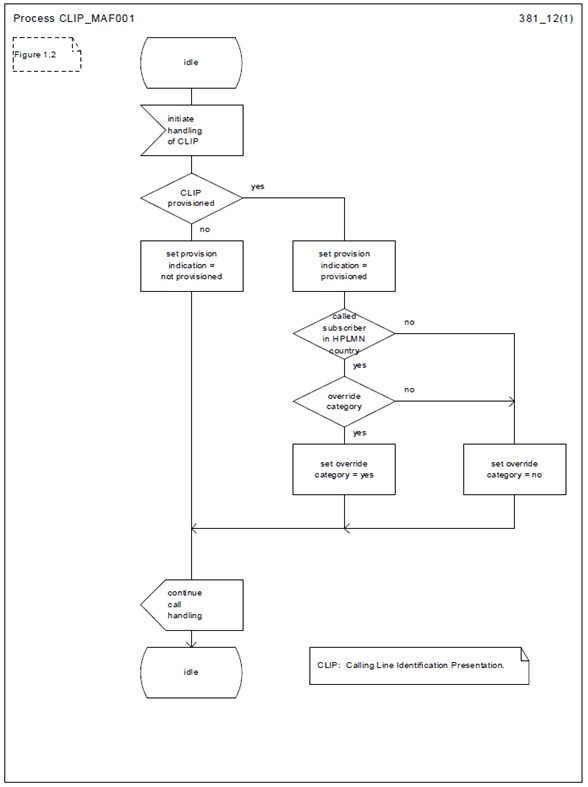
Figure 1.2: MAF001 Determination of calling line identification presentation subscription (VLR)
(⇒ copy of original 3GPP image)
(⇒ copy of original 3GPP image)
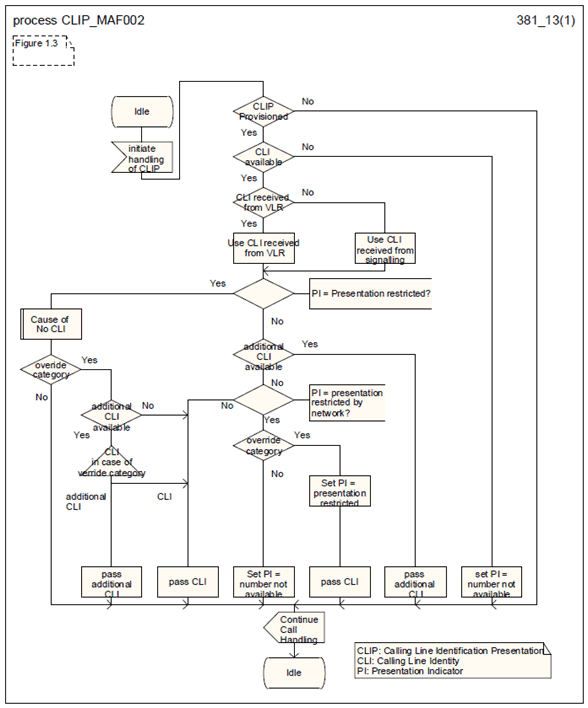
Figure 1.3: MAF002 Determination of the information for offering to the called party (destination MSC)
(⇒ copy of original 3GPP image)
(⇒ copy of original 3GPP image)
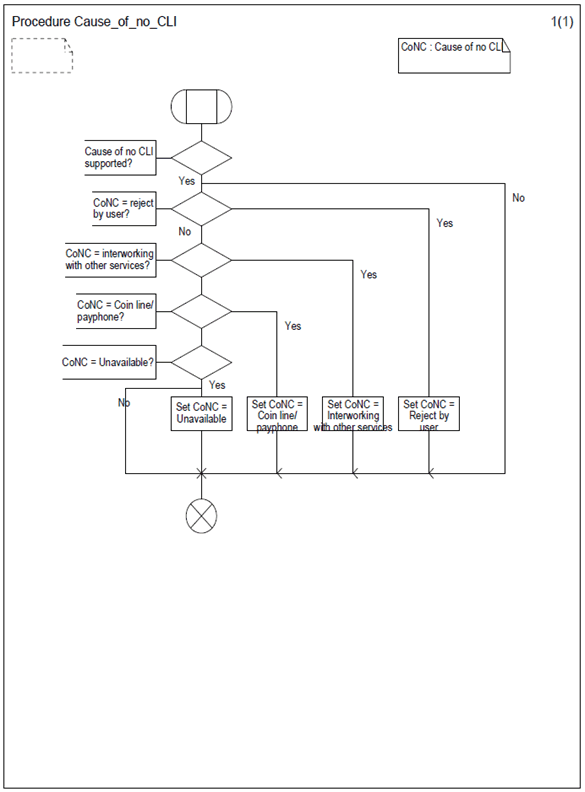
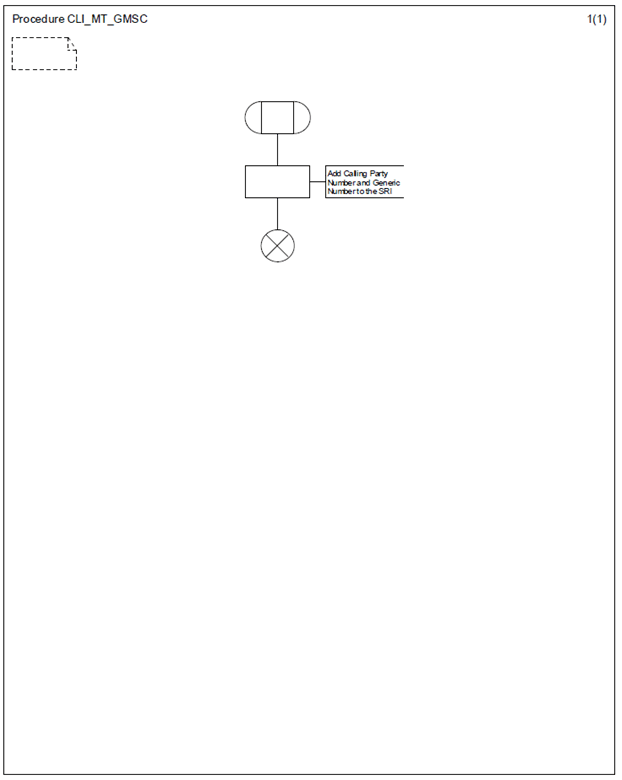
Figure 1.5: Addition of line identification information to Send Routeing Info message.
(⇒ copy of original 3GPP image)
(⇒ copy of original 3GPP image)
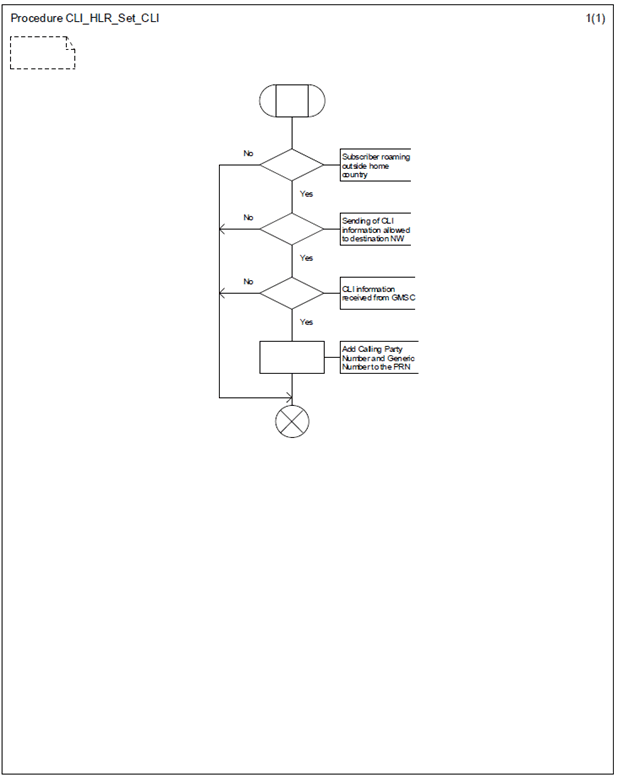
Figure 1.6: Addition of line identification information to Provide Roaming Number message.
(⇒ copy of original 3GPP image)
(⇒ copy of original 3GPP image)
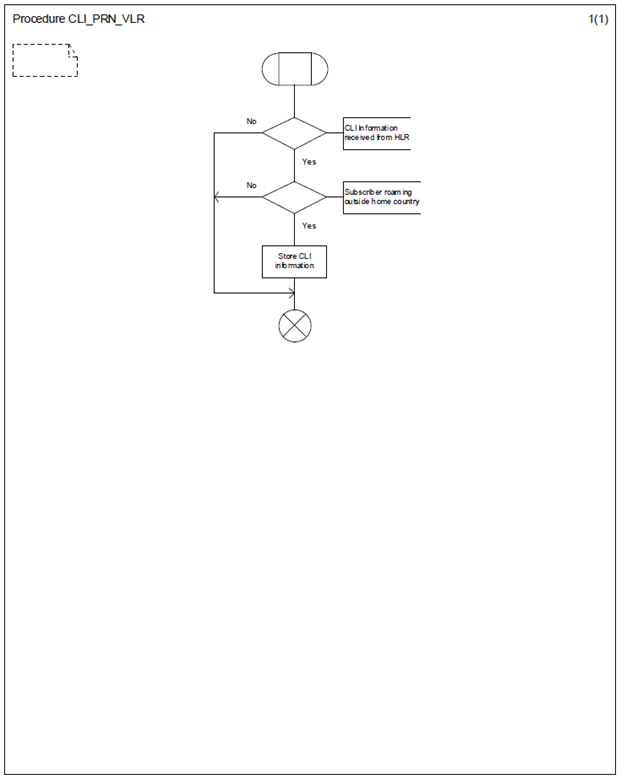
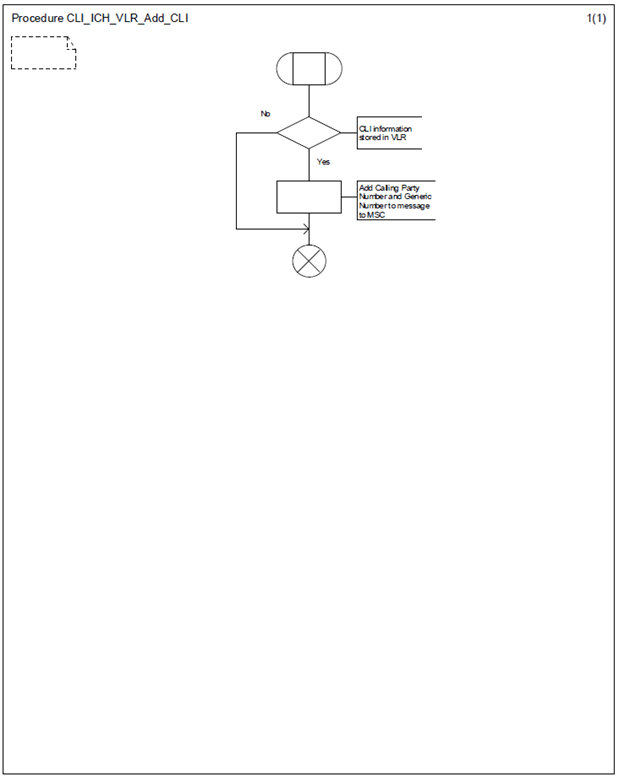
Figure 1.8: Addition of line identification information to Complete Call/Process Call Waiting message.
(⇒ copy of original 3GPP image)
(⇒ copy of original 3GPP image)
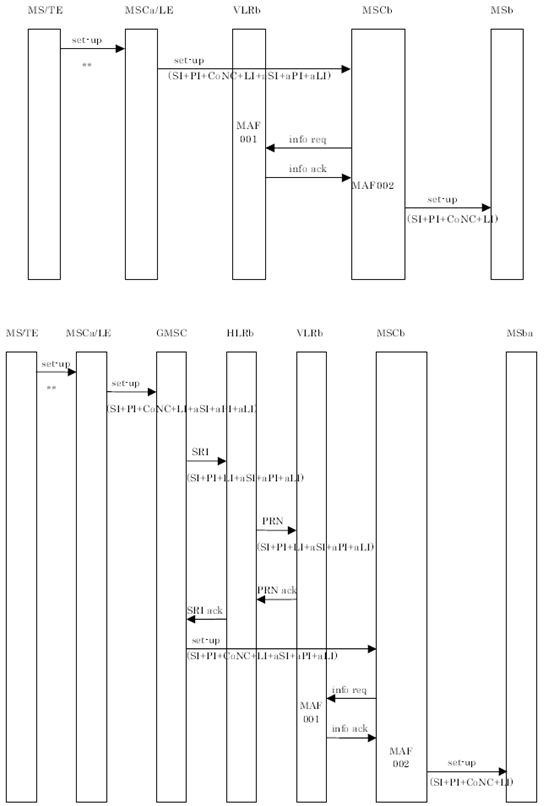
Figure 1.9: Information flow for calling line identification presentation: mobile station or fixed terminal to mobile station
(⇒ copy of original 3GPP image)
(⇒ copy of original 3GPP image)
1.2.1 Optional capability to carry calling line identification p. 19
When GMSC is performing Send Routing Info query it may pass calling line identification to the HLRb. The calling line identification shall be in international format. If the HLRb receives calling line identification within Send Routing Info it may pass unmodified calling line identification within Provide Roaming Number to the VLRb. HLR shall not pass calling line identification in the HPLMN nor in the case where sending of the CLI information is explicitly denied to the destination network..
If MSCb receives calling line identification only from signalling it shall use that parameter for presentation purposes i.e. normal handling as described in the previous clause applies.
If MSCb receives Cause of no CLI from signalling it shall be sent to the VLRb by Send Info for Incoming Call query.
If MSCb receives calling line identification and/or Cause of no CLI from VLRb and it supports the feature it shall use that parameter for presentation purposes. In this case calling line identification is stored in the VLRb and when the set-up message is processed the handling described in the previous clause is done using the stored calling line identification.
1.2.2 Information elements used in the messages p. 20
| Information Element | Logical Information element name | Information element Required | Information element description |
|---|---|---|---|
| Calling Party Number | SI | M | Calling Party Number contains screening indicator (SI), presentation indicator (PI) and line identity (LI) as mandatory information. |
| PI | M | ||
| LI | M | ||
| Generic Number | aSI | M | Generic Number contains additional screening indicator (aSI), additional presentation indicator (aPI) and additional line identity (aLI) as mandatory information. |
| aPI | M | ||
| aLI | M | ||
| Cause of no CLI | unavailable | M | Cause of no CLI contains detailed Cause of no CLI (unavailable, reject by user, interaction with other service, coin line/payphone) as mandatory information. |
| reject by user | M | ||
| interaction with other service | M | ||
| coin line/payphone | M |
1.2.3 Parameters in Send Routeing Info and Provide Roaming Number for CLI p. 20
| Message | Message sender | Information element name | Information element Required | Information element description |
|---|---|---|---|---|
| Send Routeing Info | GMSC | - | - | Refer to TS 23.018. In addition: |
| Calling Party Number | C | The information element is present if GMSC received calling party number from originating network; otherwise it shall be absent. | ||
| Generic Number | C | The information element is present if GMSC received additional calling party number from originating network or from gsmSCF because of a CAMEL service; otherwise it shall be absent. |
| Message | Message sender | Information element name | Information element Required | Information element description |
|---|---|---|---|---|
| Provide Roaming Number | HLR | - | - | Refer to TS 23.018. In addition: |
| Calling Party Number | C | The information element is present if HLR received calling party number from GMSC and MS B is outside of home country; otherwise it shall be absent. | ||
| Generic Number | C | The information element is present if HLR received additional calling party number from GMSC and MS B is outside of home country; otherwise it shall be absent. |
1.2.4 Messages between MSC and VLR in destination network p. 21
| Message | Message sender | Information element name | Information element Required | Information element description |
|---|---|---|---|---|
| Complete Call | VLR | - | - | Refer to TS 23.018. In addition: |
| Calling Party Number | C | The information element is present if it is stored in VLR; otherwise it shall be absent. | ||
| Generic Number | C | The information element is present if it is stored in VLR; otherwise it shall be absent. | ||
| Cause of no CLI | C | The information element is present if it is stored in VLR; otherwise it shall be absent. | ||
| Process Call Waiting | VLR | - | - | Refer to TS 23.018. |
| Calling Party Number | C | The information element is present if it is stored in VLR; otherwise it shall be absent. | ||
| Generic Number | C | The information element is present if it is stored in VLR; otherwise it shall be absent. | ||
| Cause of no CLI | C | The information element is present if it is stored in VLR; otherwise it shall be absent. | ||
| Send Info for Incoming Call | MSC | - | - | Refer to TS 23.018. In addition: |
| Cause of no CLI | C | The information element is present if MSC received Cause of no CLI; otherwise it shall be absent. |
1.3 Information stored in the HLR p. 21
CLIP may have the following logical states (refer to TS 23.011 for an explanation of the notation):
| Provisioning State | Registration State | Activation State | HLR Induction State |
|---|---|---|---|
| (Not Provisioned, | Not Applicable, | Not Active, | Not Induced) |
| (Provisioned, | Not Applicable, | Active and Operative, | Not Induced) |
The HLR shall store the logical state of CLIP (which shall be one of the valid states listed above) on a per subscriber basis.
The HLR shall also store the subscription option "override category" on a per subscriber basis.
This parameter takes one of the following values:
1.
yes;
2.
no.
1.4 State transition model p. 22
The following Figure shows the successful cases of transition between the applicable logical states of CLIP. The state changes are caused by actions of the service provider.
Note that error cases are not shown in the diagram as they normally do not cause a state change. Additionally, some successful requests may not cause a state change. Hence they are not shown in the diagram.
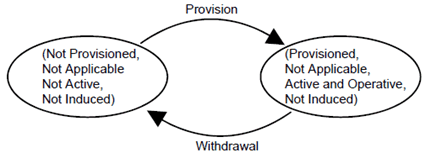
1.5 Transfer of information from HLR to VLR p. 22
If the provisioning state for CLIP is "Provisioned" then, when the subscriber registers on a VLR, the HLR shall send that VLR information about the logical state of CLIP. The HLR shall send the override category if the VLR is in the HPLMN country. The HLR may send the override category if the VLR is outside the HPLMN country.
If the logical state of CLIP or the override category is changed while a subscriber is registered on a VLR then the HLR shall inform the VLR of the new logical state of CLIP. If the override category is changed and the provisioning state of CLIP is "Provisioned" then the HLR shall inform the VLR about the new override category when the VLR is in the HPLMN country. The HLR may inform the VLR about the new override category when the VLR is outside the HPLMN country.
1.6 Information stored in the VLR p. 22
For CLIP, the VLR shall store the service state information and override category received from the HLR.
If not received from the HLR (case of roaming outside the HPLMN country), the override category shall be set to the default value "no".
1.7 Handover p. 23
Handover will have no impact on the control procedures and the operation of the service.